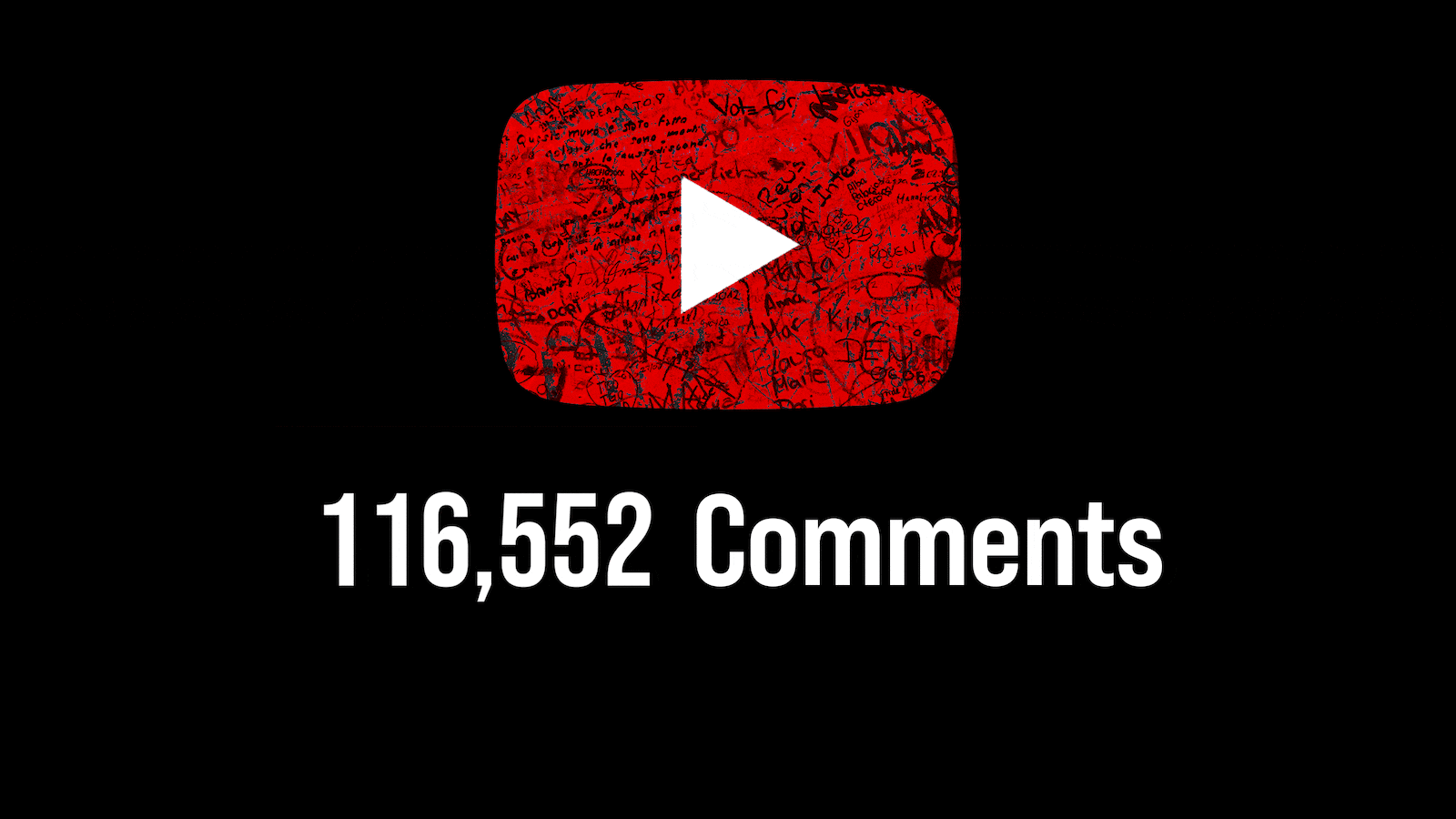At first glance, the video ‘BRODYQUEST’ looks like nothing more than standard YouTube fodder from 2010. The jaunty, electronic track—which features an image of actor Adrien Brody journeying through oceans, famous landmarks, and into space—has all the trimmings of the epic bacon internet it was uploaded onto. It was a viral sensation—even the actor himself has seen it. But it’s not the sort of video you’d imagine, 13 years later, would be hosting anything other than a partially animated graveyard of ‘Who’s here in 2023?’ comments populating other memes that only exist now as monuments to nostalgia for a lost era.
But head down to the 63,000 strong comments section, and suddenly this dead meme teems with life. Thousands of bite-sized statements relay the daily lives of their authors, ranging from the benign to the deep and intimate. “Day 37:” one starts. “Someone from my work was arrested while I was on vacation. They were a huge jerk, I wish I coulda been there to see their stupid face get hauled away.” Others comment on school, exams, parents, and struggles with gender and sexuality. “I've been seriously practicing vocal masculinization and I sound pretty awesome! I also came out to one of my closest friends, and he said he’s cool with it and goes by he/they,” a segment from another comment reads.
“Day 767: Today makes one year since my best friend, and brother, Mojo passed away,” one user, Duckable, has posted. “He wasn’t just a dog to me, he was my family. It has been incredibly hard without him, and I feel like my confidence has lowered and my anxiety has increased since his passing.”
Inspired by other commenters, Duckable, a transgender 18-year-old from Australia who prefers to remain anonymous, started logging daily journals on the BRODYQUEST video 896 days ago, in early 2021. “I've had a lot happen in the [two-plus] years that I’ve been writing these comments,” she told The Daily Beast. “My dog passed away, I was figuring out my personal identity, I was finishing high school and heading to university. Being able to write about these experiences definitely helped me manage the emotions I was feeling.”
For Duckable and the thousands of others in this video’s comments section—many of them teenagers—this long-dead meme has become an anonymous safe space for processing difficult experiences, and an unlikely carrier of coming of age stories.
BRODYQUEST isn’t the only example of this phenomenon—and in many ways, it is an outlier. YouTube’s most sentimental comments sections seem to derive from more serious and earnest music videos, often from anime and games. On the video for ‘Howl’s Moving Castle [OST - Theme Song]’, thousands of people have written diary entries inspired by an original user, Anxley, whose journaling throughout the 2020 lockdowns has seemingly granted him saint-like status. Anxley is still referenced regularly despite no longer participating. “My future kid: hey mom, can you tell me a story”, one comment, with 4.5k likes reads. “Me: So it all started with a person named Anxley.”
Perhaps the most interesting example of the comments section as a public journaling tool is on the 15-year-old upload ‘Reptilia Strokes Rock Band’. The same user, picsmics4, regularly returned for over a decade to share their appreciation for someone else’s grainy performance of the titular track on the video game Rock Band, as well as detailing their own mental health struggles. Recently catapulted into popularity in a video essay by YouTuber ShaiiValley, the comments void picsmics4 initially spilled their thoughts into has now become a thriving ecosystem of fans labeling it a gem of internet history and “one of the most wholesome internet stories” they’ve ever heard. Picsmics4 was at first confused by the reaction—but has been overwhelmed by the outpouring of support in this unlikely community. “Today, it is as if the 15 years of echos all came ringing back at once, and they were more caring, loving and powerful than anything I ever imagined,” they wrote recently.
Yet while YouTube comments sections offer a refuge that feels increasingly rare on the internet these days, these communities are at risk of extinction. Thousands of videos are removed daily for copyright infringement, with over 754.3 million undisputed claims filed in the first half of 2022 alone. And earlier this year, Google announced that they would be removing inactive YouTube accounts—provoking an outpouring of rage on Twitter and Reddit, before later rescinding the statement. “Thanks for reaching out,” a rep from the company told The Daily Beast over email, when asked to clarify their position on inactive Google accounts with YouTube videos. “Confirming we aren’t deleting accounts with YT videos—see our tweet and blog post.”
Still, the initial controversy highlights the precarity these comments sections are under. While nonprofits like the Internet Archive and the volunteer-led digital preservation group Archive Team work to conserve content, finite funding and resources mean they can only cover a tiny fraction of what’s at risk. These groups are, understandably, reluctant to direct their attention towards decades-old songs and music videos that have already been uploaded countless times on every streaming service imaginable, and have simply been “hijacked” by users looking for a private place to vent. “We’re not even good at preserving material that is on its face, a fundamental part of human culture,” Archive Team’s Jason Scott told The Daily Beast. “I can’t beat the tsunami of endless data being uploaded to YouTube.”
Oftentimes archivists are working alone to back up content on their own time. The Internet Checkpoint was a video uploaded to YouTube by user taia777 in 2012 that functioned as a hub where people came to post life updates—named after checkpoints in a video game. It was posted under a Japanese title, set against a backdrop of sprawling vines, and played the track ‘Stickerbrush Symphony’ from Donkey Kong Country 2. Its unusual, esoteric vibes and tendency to show up in YouTube’s Recommended section among otherwise unconnected content granted it a certain mythology among explorers of deep YouTube, and it became the subject of many video essays.
Unfortunately for the checkpoint’s visitors, the video was removed some time in 2021, as were all of the comments posted underneath it. Although other users reuploaded the video, commenters took to Reddit to mourn their lost histories, some of which had been compiled over a period of many years.
Luckily, solo archivist Rebane had, by chance, saved the entire taia777 channel and its content while archiving random YouTube videos. “Comments were one of those things that I knew I wanted to get into my archival workflow at some point,” Rebane told The Daily Beast. “It was actually completely accidental or coincidental that I just happened to do it.”
Rebane uploaded taia777’s videos and their associated comments to his website, hobune.stream, and posted links to these and the raw zip files on Reddit. Another user named Geauser decided to transfer the data into something more accessible at internetcheckpoint.page. Located on the page is a replica of the original Internet Checkpoint video along with an easy-to-scroll view of all of its saved comments. “The comments were a really important part of this piece of art,” Geauser told The Daily Beast. “Some people just found it cool but other people were like, that means a lot to me because I'm now able to find my own comments. That's something that's very recurrent. People want to find their own comments, and temporarily re-live what they lived when the video was still up.”
For Rebane, however, the threat of erasure on YouTube is silent and covert—and a trojan horse of internet repo agents have already been quietly homing in for some time. He pointed to YouTube’s decision in 2017 to make private every unlisted video posted before this time as a prime example.
Comments sections also frequently get disabled for other reasons, Rebane explained. YouTube’s Made for Kids function often incorrectly assigns videos as being for children, especially animated ones—which kills all comments attached to them. And while Google is protecting accounts with videos, thousands of inactive YouTube accounts made just for commenting are still at risk for erasure.
According to Jason Scott, this isn't atypical for Google, which made the move in 2019 to remove annotations on YouTube. “There was a massive ecosystem, right? People were creating works of art using annotations. They just said, we’re gonna get rid of it,” said Scott. “And Google will often make these decisions being like ‘We’re not going to support it’, because out of 35 billion videos, only 7 million have them.”
Rebane has personally archived over a million uploads since 2017, and estimates that already about one-fifth of those videos have been removed from YouTube. “I see tens of videos getting removed every day, sometimes over 100 a day, thousands every month,” he said. “If there is anything that someone values, then it should be archived because it's going to disappear from the internet.”
Direct preservation of the comments isn’t the only way to ensure they remain an influential part of the internet. ShaiiValley’s commentary on picsmics4, for example, not only brought new audiences to the comments section, but cemented the comments as a place of continued creative discussion, and something that could continue to influence people. Filipino artist Chiara Amasola spoke to The New Yorker last year about her work using YouTube comments to create the “web experience” Thesoundof.love, which compiles poignant messages users have posted about their lovers, family members, and nostalgic experiences, set to the songs they were attached to on the site.
These kinds of works arguably highlight the urgency behind keeping the comments ecosystems alive. “In 100 or 200 years, if historians were to look back at content generated on YouTube, a Mr Beast video would be less insightful than its comments,” Geauser said. “The video production is geared toward making money. Whereas the comments are non-filtered, human reaction.” Geauser added that he feels there is something magical about YouTube comments—especially in their ability to unite people. “I’m not really a religious or spiritual person, so I understand that the human brain has the capacity to create meaning out of things that are meaningless,” he said. “But when you go on a video that’s been recommended to you and that video is 10 years old, and you go in the comments and all the people are like ‘The algorithm brings us together, again. Welcome brothers and sisters.’ It’s silly, but people are connecting.”
For now, on new uploads of the internet checkpoint and across YouTube, the journals continue, as young authors reckon with the struggles of adolescent life, and the impact of their digital footprint. “The craziest thing happened today in relation to this comments section. I had a person reach out to me who’s writing an article on comment section diaries like mine!” Duckable logged, on her 897th day. “That’s a surreal experience, and I’m actually kind of interested to see where it goes.”






